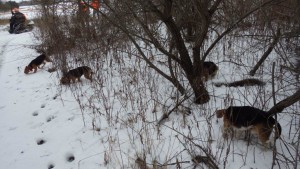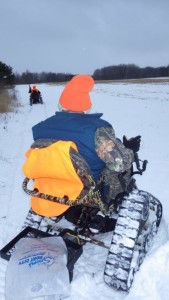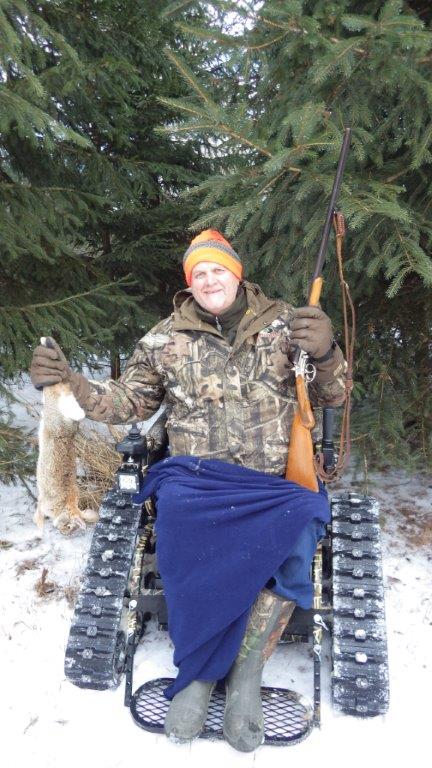 by: Tom Lounsbury
by: Tom Lounsbury
Listening to 20 beagles howling at various places in the surrounding woods, accompanied by a crescendo of (shotgun) shots here and there on a brisk winter morning is certainly a very unique sound that was quite frankly, music to my ears. I was observing a recent rabbit hunt for disabled veterans through a program called “Operation Injured Soldier” (OIS) on 400 acres of excellent wildlife habitat owned by Dr. Richard Horsch of Mayville. Personally, I’ve been on a lot of rabbit hunts with beagles in my day (which is quite a few and actually too many to count), but this one in particular surpassed them all in intensity and action.
There were 30 participants (veterans) along with skillful hunting guides and their eager hounds which were divided up into 3 teams to be stationed at strategic parts of the hunting area to keep things moving. For starters, weather-wise with snow and then freezing rain the night before, and followed by daytime overcast skies and steadily dropping temperatures, it wasn’t ideal cottontail rabbit hunting conditions. However with good ground, guides and hounds, matters can still happen and they did on this day.
Upon arriving, I noticed several rabbit hunters sitting in a very handy hunting transport designed for disabled folks who can’t walk, called the “Action Trackchair” (www.actiontrackchair.com). Picture an electric-powered wheelchair with tank treads which can even lift a hunter up into a stabile standing position when needed. Attach a gun rack, and it is ready for action. I witnessed rabbit hunters so equipped going uphill, downhill and through snow drifts, and I was hard pressed (with camera in hand) keeping up with them on foot in the snow. The Action Trackchair allowed the hunters to readily position themselves in relation to the singing beagles and join in on the fast and continually moving atmosphere.
However, the majority of rabbit hunters were on foot which clearly defines there can be much more to being a disabled veteran than physical scars. According to Dr. Horsch, anyone who has served our country in combat can be considered as being a disabled veteran. There is the emotional wound known as Post Traumatic Stress Disorder (PTSD) that wasn’t fully identified and recognized until more recent times. Veterans returning from the conflicts in Iraq and Afghanistan are a distinct testimony to this fact, but it relates to veterans of all wars and conflicts. There are the Viet Nam veterans who (now in their 60’s and 70’s) are realizing they have issues related to the war which they have kept suppressed for many years.
 A veteran himself, Dr. Horsch is fully aware of all this, because he has seen the effects of combat firsthand. He was the head of the operative section of a MASH Unit in Viet Nam (1966-67). He also remembers returning home with other soldiers and having “hippies” at an airport in Seattle on the sidelines jeering and even casting cupfuls of urine at them. What was also really dismaying was the fact police were on hand not to protect the soldiers, but instead to protect the hippies, a nasty and very unfair twist of fate for soldiers returning to society after experiencing combat for their country. Fortunately, being shunned and estranged isn’t the case today, but there is much still to be done for our veterans to help them in the healing process.
A veteran himself, Dr. Horsch is fully aware of all this, because he has seen the effects of combat firsthand. He was the head of the operative section of a MASH Unit in Viet Nam (1966-67). He also remembers returning home with other soldiers and having “hippies” at an airport in Seattle on the sidelines jeering and even casting cupfuls of urine at them. What was also really dismaying was the fact police were on hand not to protect the soldiers, but instead to protect the hippies, a nasty and very unfair twist of fate for soldiers returning to society after experiencing combat for their country. Fortunately, being shunned and estranged isn’t the case today, but there is much still to be done for our veterans to help them in the healing process.
That is why Dr. Horsch is a strong and dedicated supporter of Operation Injured Soldier (OIS) in the Thumb area. Presently the program has 3000 acres of private land available for participating disabled veterans, but it is a far cry from being enough. Presently the program can accommodate 50 veterans in the hunting field, and it could easily have 150 veterans if the land was available.
According to Dr. Horsch, participating disabled veterans are the best hunting guests a private landowner can have, because they respect the land, reliably follow the landowner’s rules and truly appreciate the hunting opportunity. There is also a signed form which releases the landowner from any liabilities. Game species the OIS participants wish to hunt are deer, wild turkey, waterfowl and rabbits.
While there are enough skilled guides (who donate their time and resources) for the OIS program, the real problem is in having enough land available. When a landowner is willing to participate, an OIS guide will review the property and answer any questions.
The” go-to” person for all of this whether you are a veteran, or private landowner (anywhere in the Thumb) wishing to participate in OIS, is Mark Zmierski, the Tuscola County Veteran Affairs Director (mzmierski@tchd.us, or call 989-673-8148). His office hours Monday – Friday are 8am – 4pm, and until 7pm the first and second Tuesday of the month.
During the recent OIS rabbit hunt near Mayville, the participants bagged 48 rabbits (29 in the morning, and 19 in the afternoon), so it was an action packed day for all. During lunch I had the opportunity to sit down and visit with some of the veterans. Several mentioned how OIS was a literal life saver for them, and that the camaraderie involved, and also being able to talk to fellow veterans who have been there (and fully understand), is the best therapy ever. They all agreed that being able to go hunting certainly helps in the healing process.
All veterans have my sincere gratitude for their service.
Contact telephone numbers for other Thumb area Veteran Affairs offices are:
Huron County – (989) 269-8911
Sanilac County – (810) 648-0212
Lapeer County – (810) 667-0256

